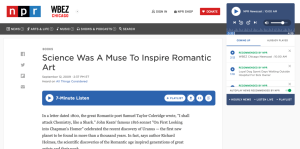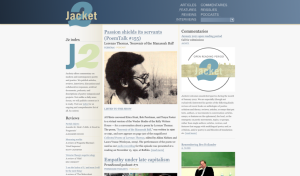General Interest
Back to Top
|
 |
|
Cite Black Women
|
Social studies |
|
The purpose of Cite Black Women is encompassed by its name. The collective works "to push people to critically rethink the politics of knowledge production by engaging in a radical praxis of citation that acknowledges and honors Black women's transnational intellectual production." In other words, "it's time to give credit where credit is due." Readers may want to begin by browsing the Our Praxis and Our Collective pages. Then, readers can dive into the organization's work. This work takes many forms, with social media platforms (@CiteBlackWomen on Twitter, Instagram, and Facebook), a blog (under Our Blog) sharing input from various writers, and a podcast (under Our Podcast) where guests discuss their research and citation politics generally. In addition to the Soundcloud link embedded at the site above, listeners will find the Cite Black Women podcast on Google Play, Stitcher and iTunes. The show is produced by Christen Smith (who also hosts the show and launched the collective) and Michaela Machicote, with audio engineering from Lydia Fortuna. [EMB] |
|





|
|
 |
|
Project Cornelia
|
Arts |
|
Computer science and creativity combine in Project Cornelia, a "hybrid research engine" that analyzes 17th-century art using data-based processes and tools. To begin, visitors may want to check out the Filters tab to see how the project has evolved over the past decade. Readers will also find links to publications and presentations featuring the work in this section. Visitors may also want to browse the project's Twitter account (@projectcornelia) to stay up-to-date on the latest advancements. To explore the project's browser, head over to the Live Tools tab. Here, users can conduct a search by artist name or year and filter by collection ("guild" or "parish" records). For example, a search for "1800" in "guild records" reveals a host of artists. After selecting one from the list, users will find additional details about their family, teachers, and students. The project is led by Koenraad Brosens, a professor in the Art History Department of Leuven University (Belgium), who is equally enthusiastic about computer science. [EMB] |
|





|
|
 |
|
Equity Unbound: Community Building Activities
|
Educational Technology |
|
Recognizing that online learning creates unique obstacles and opportunities for building community, a team of educators crafted this resource kit to assist their fellow instructors in creating inclusive and engaging virtual classrooms. Though many activities are geared toward educational settings, event organizers may also appreciate this tool. The activities were curated with "intentionally equitable hospitality," in mind, a framework that emphasizes the importance of meeting people where they are at, in order to make them feel welcome, and recognizes the different needs and perspectives of those within any given classroom or group. Activities range from short exercises that give students a break during class to icebreakers that will help create respectful and relational classrooms. Clicking on an activity will reveal additional details that may include a purpose statement, preparation guide, instructions, and other resources. This activity kit is a collaboration between OneHE (an educator support organization) and Equity Unbound (a collaborative curriculum focused on principles of equity, open access, connection, and intercultural learning experiences). [EMB] |
|





|
|
 |
|
Data Feminism
|
Science |
|
Yesterday, February 11, the world celebrated International Day of Women and Girls in Science. This day draws attention to the need for gender equality in STEM fields and recognizes the contributions that women add to the disciplines. Perhaps the celebration sparked an interest in further exploring data science through a feminist lens. If so, interested readers may enjoy Data Feminism, available as an open text through MIT Press. Authored by Catherine D'Ignazio and Lauren Klein, Data Feminism explores power dynamics within data collection and production, asking questions like "Data science by whom?"; "Data science for whom?"; and "Data science with whose interests in mind?" The pair draw on Kimberle Crenshaw's scholarship on intersectional feminism and creates a spin-off of bell hooks's idea that "feminism is for everybody," by arguing that "data feminism is for everybody." The eight main chapters cover themes including: data visualization, racism, and sexism. Though the text delves into several topics, D'Ignazio and Klein acknowledge that the book is a starting point and they invite readers to continue exploring diverse perspectives on "data, design, and justice." In addition to reading the text on the site above, readers can download chapters as PDF, Word, or EPUB files (among other options) via the right-hand corner Download box. [EMB] |
|





|
|
 |
|
Disabled Writers
|
Language Arts |
|
Disabled Writers strives to ensure that, when it comes to disability representation, there is "nothing about us without us." The site primarily serves as a database of disabled writers and disabled sources, eliminating any chance of the "I couldn't find anyone," excuse for lack of diversity. The database includes more than 175 writers with diverse expertise, ranging from science and technology to theater and pop culture. A chart conveniently catalogs writers by byline and area of expertise and clicking on a name reveals additional details, including a biography, portfolio links, and contact information. In addition to this database, readers may enjoy the Disabled Writers Blog. As a new project, the blog's archive is limited, but expanding. Readers will find an honest discussion about journalistic mediums and mental health, with more writing to come (and an opportunity to pitch pieces for publication). Both aspects are crucial, as "20 percent of the population, which includes media consumers and creators, is disabled, and it is important to put disabled people in charge of their own narratives." The platform is supported by Alice Wong and the Disability Visibility Project (a previously highlighted resource that made the 05-29-2020 Scout Report "Best Of 2020" issue). [EMB] |
|





|
|

















